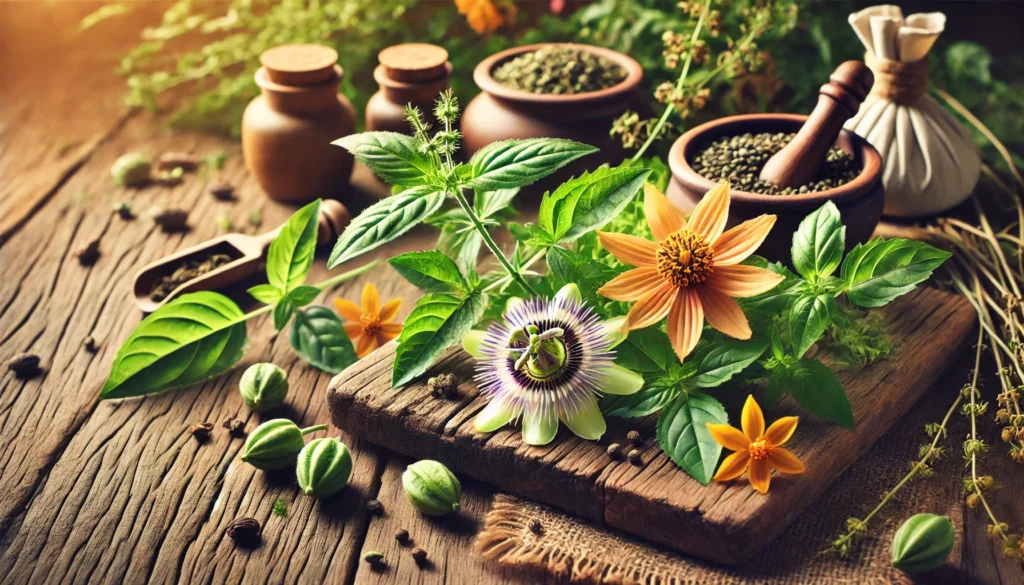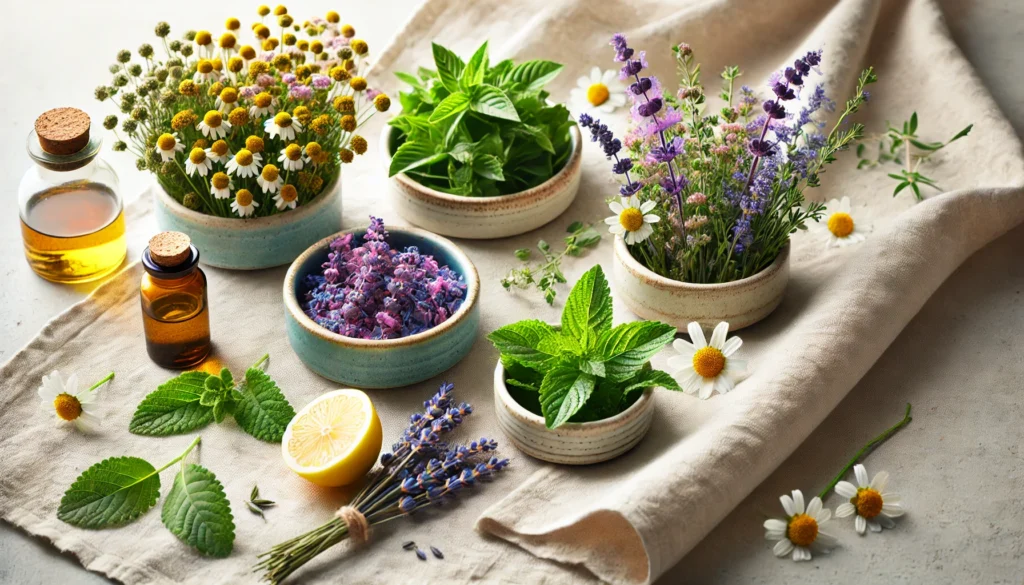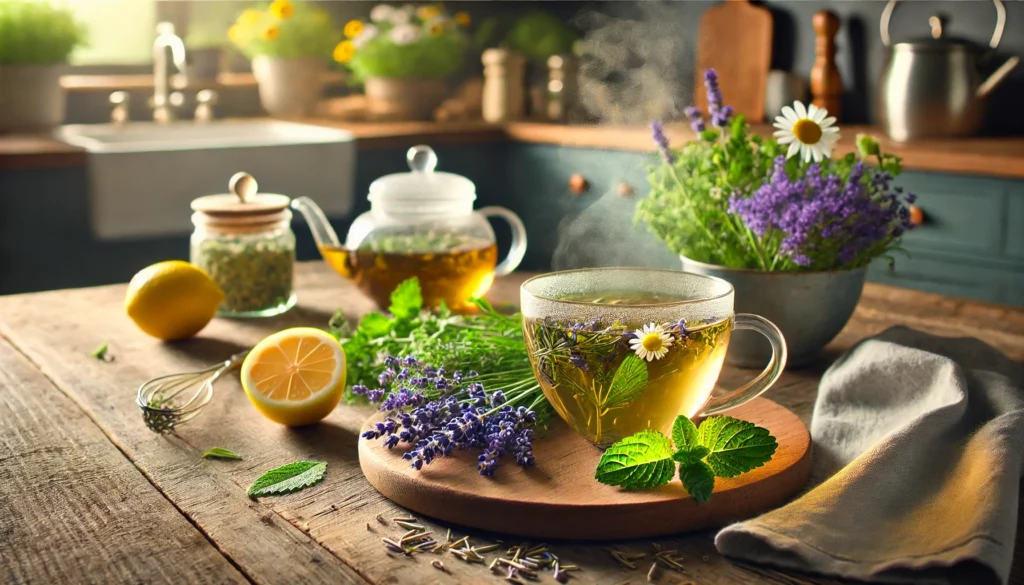In the fast-paced world we live in, stress has become a common companion. It’s a silent predator, gnawing at our peace of mind.
But what if there were natural ways to combat this unwelcome guest?
Enter the world of herbs.
For centuries, traditional medicine has turned to nature’s bounty for relief. Among the most treasured finds are herbs that calm the nerves.
These plants, steeped in history and culture, offer a gentle touch. They whisper to our nervous system, coaxing it back to a state of balance.
But it’s not just about folklore and ancient wisdom.
Modern science is beginning to validate these herbal remedies. Rigorous studies are uncovering the secrets of these plants, revealing how they can help us manage stress and anxiety.
This article will guide you through the top 10 herbs for stress relief.
We’ll delve into their historical uses, the science behind their calming effects, and practical ways to incorporate them into your daily life.
Whether you’re a health and wellness coach, a science journalist, or a biohacker, this comprehensive guide is for you.
It’s time to explore the soothing power of herbs.
Let’s embark on this journey together, towards better mental health and wellness.
Welcome to the world of calming herbs.
You may also like: Enjoyable Techniques for Reducing Daily Stress
Understanding Stress and the Nervous System
Stress is a part of life, but it’s more complex than we think. At its core, stress is the body’s reaction to any change that requires adjustment. When faced with stress, the body’s nervous system springs into action.
The stress response is a survival mechanism that has kept humans safe for centuries.
How does this work? It involves several components of the nervous system, each playing a pivotal role. This response is crucial for managing immediate dangers but can be harmful if triggered too often.
Chronic stress can wreak havoc on your body and mind. The overactivation of the stress response is linked to numerous health issues. Anxiety, depression, and even heart disease are among the common repercussions.
Understanding how stress affects the body can empower us to manage it better.
Key components involved in the stress response include:
- The Central Nervous System (CNS) controls the release of hormones.
- The Autonomic Nervous System (ANS) regulates involuntary actions.
- The Sympathetic Nervous System (SNS) triggers the “fight or flight” response.
- The Parasympathetic Nervous System (PNS) helps restore calm after stress passes.
These systems, while integral, can become imbalanced. It’s in this imbalance that herbs can work their magic, gently restoring equilibrium.
The Role of the Nervous System in Stress Response
In a stress situation, the nervous system shifts gears. It initiates the “fight or flight” response for survival. This response is orchestrated by the sympathetic nervous system.
When activated, hormones like cortisol flood the bloodstream. These changes prime the body to deal with the threat.
Once the danger subsides, the parasympathetic nervous system takes over. It works to return the body to a state of rest and recovery. This process is meant to be temporary.
However, in today’s world, stressors are often constant. The nervous system can stay in this heightened state for too long. This is where calming interventions can come in handy.
Understanding this response is the first step in addressing chronic stress. By modulating these responses, we can reduce the adverse effects of stress on the body.
Historical Use of Herbs for Calming the Nerves
Herbal remedies have a rich history in traditional medicine. Cultures around the world have turned to plants for healing. From the ancient Egyptians to the Indigenous peoples of the Americas, herbs were integral to health practices.
Herbs have historically been used to calm the mind and body. In Traditional Chinese Medicine, herbs like ginseng and licorice root were used to balance energy. Ayurveda, the ancient Indian system of medicine, employed herbs like ashwagandha to reduce stress.
These traditions recognized the power of nature. They understood how plants could influence the mind and body.
Ancient texts are filled with references to these calming herbs, serving as time capsules of herbal knowledge.
Though our understanding of herbs has evolved, the foundation remains the same. Using nature to heal is a timeless approach. Today, these ancient practices are backed by scientific research, bridging tradition with modern science.

The Science Behind Herbal Stress Relief
Herbal remedies are more than folklore; they’re backed by science. Research into herbs reveals their complex chemistry. Specific compounds are responsible for calming effects on the body. These are known as phytochemicals, and each herb has a unique profile.
Phytochemicals can affect the nervous system in profound ways. They interact with receptors and hormones to influence mood and stress levels. Understanding these interactions is key to appreciating how herbs work.
Stress relief from herbs can be attributed to several actions. Some herbs enhance neurotransmitters that promote relaxation. Others help the body adapt to stress through their adaptogenic properties. These diverse mechanisms provide a natural avenue for stress relief.
Advances in science allow us to isolate and study these chemicals. This research validates traditional uses and opens new possibilities for health. By focusing on the specific phytochemicals, scientists can better understand their benefits and potential applications.
Incorporating herbs into daily life can promote balance in the body. They offer a complementary approach to conventional therapies. The holistic effects of herbs encompass more than just stress relief. They support overall well-being through a gentle, natural process.
The following list outlines some key phytochemicals found in stress-relieving herbs:
- Alkaloids: Affect neurotransmitter activity and mood regulation.
- Flavonoids: Antioxidant properties help mitigate stress-induced damage.
- Tannins: Provide astringent qualities and promote relaxation.
- Saponins: Support immune function and increase stress resilience.
While the science is still evolving, what we know is promising. Herbs offer a natural way to calm the nerves, complementing modern lifestyle changes.
Phytochemicals and Their Effects on the Body
Phytochemicals are natural compounds with potent biological effects. They are found in all plants but vary from one to another. In herbs, these compounds play a key role in therapeutic actions. Each phytochemical can interact with different systems in the body.
For instance, alkaloids can impact the central nervous system. They influence neurotransmitters that regulate mood and stress responses. This impact is why certain herbs are effective in alleviating anxiety.
Flavonoids, another important group, possess antioxidant properties. They protect the body from oxidative stress, often heightened in anxious states. By reducing oxidative damage, they promote overall well-being.
Then, there are tannins, known for their calming effects. These compounds can soothe the digestive system, often affected by stress. Their astringent properties also contribute to relaxation and stress mitigation.
Different phytochemicals work in synergy, amplifying each other’s effects. This synergy makes herbs a powerful ally against stress and anxiety. By understanding how these compounds work, one can better harness their benefits for personal health.
Validating Traditional Herbal Remedies Through Research
Scientific validation is essential for traditional remedies. It bridges ancient wisdom with modern understanding. Research provides evidence for the efficacy and safety of herbal treatments. This validation is crucial in gaining wider acceptance and trust.
Clinical studies test specific herbs under controlled conditions. These studies measure their impact on stress markers and symptoms. Positive outcomes affirm the traditional uses of many herbs. They show that these age-old remedies are more than just folklore.
Standardized extracts are often used in research. This ensures consistency in the strength and purity of the herb used. Through these studies, researchers can assess how herbs can be integrated into modern medicine.
It’s important to differentiate anecdotal evidence from scientific data. While personal testimonies provide insight, rigorous trials offer concrete proof.
The accumulated research also highlights the safety of using herbs. It identifies potential side effects and interactions with medications. Awareness of these factors is essential for responsible herbal use. This systematic approach ensures that herbal remedies are both effective and safe for stress relief.

Top 10 Herbs That Calm the Nerves
Herbal remedies have been used for centuries to soothe the mind. Many herbs offer profound calming effects, helping to ease stress. Science now backs these traditional uses, adding credibility to their effectiveness. Here’s a closer look at ten remarkable herbs that relax the nervous system.
1. Ashwagandha
Ashwagandha is a renowned adaptogen, enhancing resilience to stress. It regulates cortisol levels, balancing the body’s stress response. This ancient root has roots in Ayurvedic medicine. Research highlights its efficacy in reducing anxiety and improving sleep.
Benefits of Ashwagandha:
- Decreases stress and anxiety levels.
- Improves sleep quality.
- Supports overall mental health.
2. Lavender
Lavender is famous for its soothing scent and calming properties. It has been shown to reduce anxiety and improve mood. This herb can be used in various forms, including oils and teas. It promotes relaxation by influencing the nervous system.
Ways to Use Lavender:
- Essential oil for aromatherapy.
- Brewed as a calming herbal tea.
- Added to bathwater for relaxation.
3. Chamomile
Chamomile is a gentle herb known for its anti-anxiety effects. It acts as a mild sedative, making it ideal for sleep issues. Regular consumption can ease stress and promote calmness. Chamomile is widely used in herbal teas for its soothing effects.
Chamomile Usage Tips:
- Consume as a herbal tea for calming effects.
- Use chamomile extract for concentrated benefits.
- Integrate with other calming herbs in tea blends.
4. Lemon Balm
Lemon balm has a light, lemony scent and a calming influence. It is known to alleviate stress and boost cognitive function. By modulating mood, lemon balm can enhance mental clarity. It is often combined with other calming herbs for synergistic effects.
Benefits of Lemon Balm:
- Enhances mood and cognitive functions.
- Reduces stress and anxiety.
- Promotes mental clarity and focus.
5. Passionflower
Passionflower is an effective remedy for stress and insomnia. It helps increase gamma-aminobutyric acid (GABA) in the brain. This action reduces overactivity in the brain, calming the mind. Passionflower is particularly useful for easing restlessness.
Using Passionflower:
- Drink as an herbal tea to promote relaxation.
- Use tinctures for more concentrated effects.
- Combine with other herbs for enhanced calming benefits.
6. Valerian Root
Valerian root has long been valued for its sedative properties. It improves sleep quality by reducing the time it takes to fall asleep. Valerian is often used for its tranquilizing effects. It’s ideal for those struggling with anxiety-related sleep issues.
Valerian Root Benefits:
- Promotes deep and restful sleep.
- Reduces anxiety and nervousness.
- Acts as a natural sedative for better relaxation.
7. Rhodiola Rosea
Rhodiola Rosea is a powerful adaptogen that combats stress. It enhances resilience to physical and mental stressors. Known for boosting mood, it supports overall mental well-being. Rhodiola also improves stamina, making it unique among calming herbs.
Advantages of Rhodiola Rosea:
- Reduces fatigue and stress.
- Enhances mood and cognitive function.
- Boosts energy and stamina.
8. Holy Basil (Tulsi)
Holy Basil, or Tulsi, is revered in Ayurvedic practices. It helps regulate stress by lowering cortisol and improving mood. This sacred herb is known for its comprehensive health benefits. It is effective in reducing anxiety and promoting a sense of balance.
Tulsi Usage Ideas:
- Brew as an herbal tea to unwind.
- Add Tulsi leaves to meals for added health benefits.
- Use as a dietary supplement for stress relief.
9. St. John’s Wort
St. John’s Wort is often used for mild to moderate depression. It is a well-researched herb that can lift mood and reduce anxiety. While it is effective, it requires careful consideration due to interactions. It’s vital to consult with a healthcare provider before using St. John’s Wort.
Key Points for St. John’s Wort:
- Enhances mood and alleviates depression symptoms.
- Reduces anxiety and promotes calmness.
- Be aware of potential interactions with medications.
10. Kava
Kava is a traditional drink from the Pacific Islands known for its relaxing effects. It can significantly reduce anxiety without impairing mental clarity. However, caution is needed due to potential liver implications. Kava is best used under professional guidance.
Kava Benefits:
- Alleviates anxiety quickly and effectively.
- Promotes relaxation without sedation.
- Best used with medical supervision due to safety concerns.
These herbs offer varied benefits for those seeking natural stress relief. Integrating them into your routine can provide a gentle and effective approach to managing stress and anxiety.
How to Use Herbs for Stress Relief
Incorporating herbs into your daily routine can enhance stress management. Whether through teas, tinctures, or capsules, herbs provide versatile options. Understanding how to use these natural remedies effectively is key.
Herbal teas are a simple and pleasurable way to enjoy calming benefits. You can blend various herbs based on taste and desired effects. Tinctures offer concentrated herbal extracts and are convenient for on-the-go use.
Capsules provide a consistent dosage of herbs, making them ideal for those with busy schedules. It’s crucial to follow recommended dosages for each form to avoid any potential side effects.
Aromatherapy with essential oils, such as lavender and chamomile, offers immediate relaxation. Simply inhaling these scents can have a profound calming effect on the nervous system. Bath blends or massage oils can further enhance these soothing properties.
Taking herbs regularly in a consistent regimen can improve effectiveness. It’s vital to listen to your body and adjust usage based on personal responses.
Combining herbs with lifestyle changes, such as exercise and mindfulness practices, can yield significant improvements in stress management. Adding these herbs to your daily health routine can lead to holistic well-being.
Ways to Use Herbs for Stress Relief:
- Herbal teas for a comforting daily ritual
- Tinctures for quick, concentrated doses
- Capsules for convenient supplementation
- Aromatherapy oils for immediate calming effects
- Bath blends for a relaxing soak
Selecting High-Quality Herbal Supplements
Choosing high-quality herbal supplements ensures safety and efficacy. Start by checking for products that have been third-party tested. These tests confirm purity and the absence of harmful substances.
Look for supplements with clear ingredient labels and without unnecessary fillers. Quality brands often provide detailed information about the origin and processing of their herbs.
Herbs sourced from organic or sustainably managed farms are preferable. This ensures the absence of pesticides and promotes environmental health.
Consult with a healthcare provider when selecting supplements, especially if you have existing conditions or take other medications. Trusted suppliers and positive user reviews can guide you in your choice.
Criteria for Selecting Herbal Supplements:
- Third-party testing for quality assurance
- Clear ingredient labels without fillers
- Organic and sustainably sourced ingredients
- Consultation with healthcare providers
- Positive consumer reviews and reputable brand
Safety Considerations and Potential Interactions
While herbs are natural, they can still cause side effects or interactions. Some herbs may interact with medications, affecting their effectiveness. Consulting a healthcare provider before starting any herbal regimen is crucial.
Be aware of your body’s reactions, and stop use if adverse effects occur. Gradually introducing new herbs allows for monitoring their effects on your system.
Pregnant or breastfeeding individuals should avoid certain herbs due to potential risks. Additionally, individuals with chronic illnesses should take extra precaution.
Research dosage recommendations and start with lower doses, gradually increasing as tolerated. This practice minimizes the risk of adverse reactions.
Safety Precautions for Herbal Use:
- Consult with healthcare providers before use
- Monitor for adverse reactions and adjust usage
- Avoid certain herbs during pregnancy or illness
- Research proper dosages and introduce herbs gradually
- Stay informed about potential drug interactions
Employing these strategies ensures a safe and effective experience with herbal remedies for stress relief.

Integrating Herbs with Lifestyle for Maximum Benefit
Combining herbs with lifestyle adjustments enhances their effectiveness in managing stress. This holistic approach can lead to sustained improvements in mental health and well-being. Understanding the interplay of lifestyle and herbal remedies is crucial for maximizing benefits.
Lifestyle Factors in Managing Stress and Anxiety
Several lifestyle factors play pivotal roles in stress and anxiety management. Regular physical activity boosts mood and reduces stress by releasing endorphins. Exercise also enhances the efficacy of herbal remedies by improving overall health.
A balanced diet supports the nervous system. Nutrient-rich foods provide the building blocks for neurotransmitters. Incorporating anti-inflammatory foods can further reduce stress, complementing the actions of calming herbs.
Sleep quality impacts stress levels and overall health. Herbal remedies, like valerian root, can assist in achieving restful sleep. However, maintaining a consistent sleep schedule is equally important.
Mindfulness and meditation practices offer powerful stress-relief benefits. Incorporating herbs into these routines can deepen relaxation and mental clarity.
Essential Lifestyle Factors:
- Regular Exercise: Enhances mood and reduces stress
- Balanced Diet: Supports nervous system health
- Quality Sleep: Crucial for stress management
- Mindfulness Practices: Boosts relaxation and mental clarity
Combining Herbal Remedies with Stress-Reduction Techniques
Herbs complement various stress-reduction techniques, amplifying their effects. Breathing exercises, for example, are more effective when combined with calming herbal teas like chamomile or lemon balm. This integration fosters a deeper sense of calm.
Yoga combines physical activity with mindfulness, reducing anxiety levels. Drinking a cup of ashwagandha tea before practice can enhance this sense of tranquility. The synergy between herbal remedies and yoga promotes holistic stress relief.
Progressive muscle relaxation is enhanced by herbs such as kava, known for its muscle relaxant properties. This combination can help alleviate tension and support relaxation.
Aromatherapy massages use herbal-infused oils to provide a calming experience. Lavender oil in particular enhances relaxation, making it an excellent choice for stress relief. Such a holistic approach can lead to comprehensive well-being.
Effective Combinations:
- Breathing Exercises + Herbal Teas: Deepens relaxation
- Yoga + Ashwagandha Tea: Enhances tranquility
- Progressive Muscle Relaxation + Kava: Alleviates tension
- Aromatherapy Massage + Lavender Oil: Promotes calm
By integrating herbs with lifestyle practices and stress-reduction techniques, individuals can achieve a more profound and lasting reduction in stress and anxiety. This approach not only addresses symptoms but also promotes an overall state of well-being.

The Role of Herbs in Biohacking for Mental and Physical Health
Biohacking involves taking control of your body’s biology to optimize health. Herbs play a critical role in this pursuit. Leveraging natural compounds, they can enhance mental acuity and physical endurance.
Incorporating herbs into daily routines has gained popularity. This trend seeks to boost brain function and energy levels. Understanding how to use specific herbs can provide significant benefits.
Optimizing Mental Focus and Physical Stamina with Herbs
Certain herbs are renowned for improving mental focus and physical stamina. Ashwagandha is an adaptogen that helps the body handle stress and enhance performance. It supports mental clarity and energy levels.
Rhodiola Rosea combats fatigue, improving alertness and concentration. Its adaptogenic properties help balance the stress-response system. These factors contribute to heightened mental and physical capabilities.
Ginseng is another powerful herb for endurance. It’s known to enhance concentration and reduce mental fatigue. By supporting cognitive function, it becomes invaluable in the biohacker’s toolkit.
Consider the following herbs for enhancing focus and stamina:
- Ashwagandha: Reduces stress, boosts clarity
- Rhodiola Rosea: Fights fatigue, enhances alertness
- Ginseng: Increases concentration, reduces fatigue
Incorporating these herbs into a biohacking routine can have profound effects. The key is consistency and understanding each herb’s unique benefits.
The Emerging Trend of Biohacking with Herbal Remedies
The biohacking community is increasingly turning to herbs. As natural supplements, they provide a gentle approach to optimization. This trend reflects a desire for holistic health improvements.
Herbs offer a wide array of cognitive and physical benefits. They can be used strategically to target specific health goals. This aligns with the core principles of biohacking, emphasizing personalized health strategies.
Biohackers seek evidence-based approaches. Herbs with strong scientific backing are favored. This ensures safety and efficacy in their pursuit of enhanced health.
Biohackers often blend various herbs for synergistic effects. This customization allows for tailored health solutions, further emphasizing the importance of personalized care.
Key points about this trend include:
- Holistic Approach: Emphasizes natural benefits
- Personalized Health: Tailored strategies for individuals
- Evidence-Based: Preference for scientifically supported herbs
- Synergistic Blends: Custom solutions for optimal results
By adopting herbal remedies, biohackers tap into nature’s wisdom. This trend showcases a growing movement toward integrating traditional practices with modern aspirations for peak performance.
The Future of Herbal Medicine in Stress Management
Herbal medicine has a promising future in stress management. As research evolves, understanding of herbs expands. This contributes to their growing acceptance in mainstream health.
The integration of herbal remedies into modern therapies reflects a shift. People are increasingly seeking natural solutions. Herbs offer an array of options for combating stress.
Advancements in science are crucial. They enable precise formulations and dosages. This precision enhances the effectiveness of herbal stress relief methods.
Innovative approaches blend tradition with technology. Herbs are being combined with modern delivery systems. This ensures optimal absorption and consistent outcomes.
Emerging focus areas in herbal stress management include:
- Precision Medicine: Customizing herbs for individual needs
- Advanced Research: Providing stronger evidence of benefits
- Integration with Technology: Enhancing delivery and effectiveness
The future of herbal medicine is bright. With more research and development, herbs will continue to play a critical role in managing stress naturally and effectively.
Sustainable and Ethical Sourcing of Herbal Products
Sustainability is essential in herbal sourcing. Ethical practices ensure the longevity of natural resources. Herbal products must be harvested responsibly.
Transparent supply chains support these goals. Consumers demand accountability in sourcing practices. This drives ethical production methods in the industry.
Efforts to ensure sustainability safeguard both the environment and the community. This results in high-quality herbal products that consumers can trust.
The Potential of Herbs in Future Mental Health Therapies
Herbs hold significant potential for mental health therapies. Future treatment approaches may incorporate specific herbs for targeted outcomes. This aligns with a rising demand for natural therapies.
Ongoing studies are exploring herbs’ effects on neurotransmitters. This research could unlock new treatment possibilities. Herbal remedies may complement existing mental health practices.
The integration of herbs in mental health could provide new pathways. Such developments promote holistic healing. Using herbs may become a standard component in mental health care protocols.

Conclusion and Final Thoughts
The journey through stress relief with herbs reveals a rich tapestry. From ancient traditions to modern scientific findings, herbs continue to offer profound benefits. Their ability to support and calm the nervous system positions them as invaluable allies.
As we’ve explored, these natural remedies stand the test of time. Each herb brings unique properties and uses, providing a holistic approach. When combined with lifestyle changes, the impact multiplies significantly.
The key is consistency and informed use. Understanding herbs’ roles, benefits, and interactions can optimize your stress management strategy. Consultation with professionals further personalizes and ensures safe application.
As the demand for natural options grows, herbs remain at the forefront. Balancing scientific evidence with traditional knowledge presents unlimited potential. Our evolving relationship with these plants promises to enhance well-being, offering new hope in the quest for mental peace.
Further Reading:
7 Incredible Herbs for Anxiety, Insomnia & Stress
8 Calming Herbs for Stress and Anxiety, According to to Integrative Health Experts
Important Note: The information contained in this article is for general informational purposes only, and should not be construed as health or medical advice, nor is it intended to diagnose, prevent, treat, or cure any disease or health condition. Before embarking on any diet, fitness regimen, or program of nutritional supplementation, it is advisable to consult your healthcare professional in order to determine its safety and probable efficacy in terms of your individual state of health.
Regarding Nutritional Supplements Or Other Non-Prescription Health Products: If any nutritional supplements or other non-prescription health products are mentioned in the foregoing article, any claims or statements made about them have not been evaluated by the U.S. Food and Drug Administration, and such nutritional supplements or other health products are not intended to diagnose, treat, cure, or prevent any disease.


